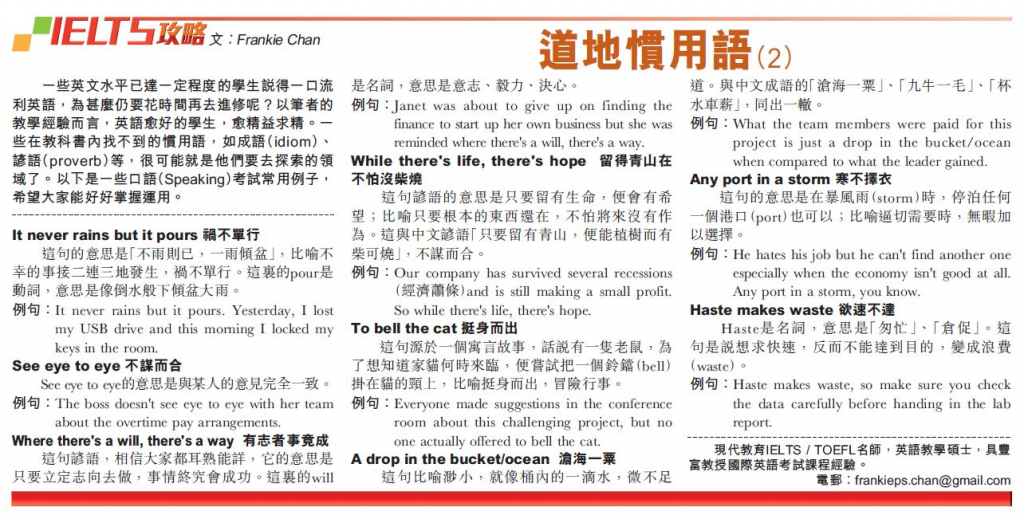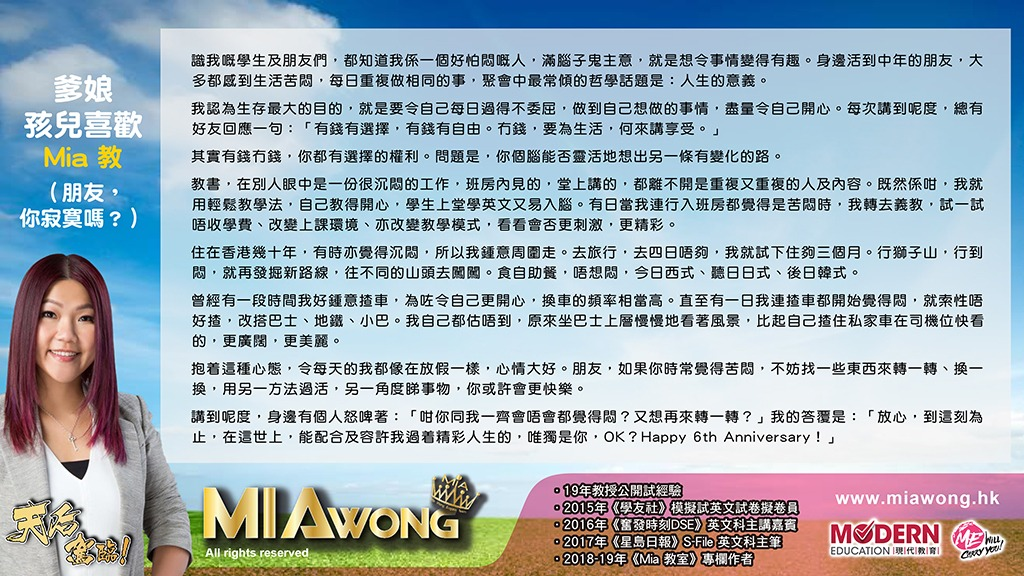
運用慣用語 說話更地道(二)
在英語培訓的職業生涯中,筆者不時教授一些英語水平已達一定程度的學生,既然他們說得一口流利的英語,為甚麼還要花時間再去進修呢?以筆者的教學經驗而言,英語愈好的學生,愈會追求更高、更好的層次,精益求精。一些在科書內找不到的慣用語,如成語(idiom )、諺語(proverb)等,很可能就是他們要去探索的領域了。以下是一些口試常用的例子,希望大家能好好地掌握運用。
It never rains but it pours 禍不單行
這句的意思是「不雨則已,一雨傾盆」,比喻不幸的事接二連三的發生,禍不單行。這裏的pour是動詞,意思是像倒水般下傾盆大雨。
例句:It never rains but it pours. Yesterday, I lost my USB drive and this morning I locked my keys in the room.
See eye to eye 不謀而合
See eye to eye的意思是與某人的意見完全一致。
例句:The boss doesn’t see eye to eye with her team about the overtime pay arrangements.
Where there’s a will there’s a way 有志者事竟成
這句諺語,相信大家都耳熟能詳,它的意思是只要立定志向去做,事情終究會成功。這裡的 will是名詞,意思是意志、毅力、決心。
例句:Janet was about to give up on finding the finance to start up her own business but she was reminded where there’s a will, there’s a way.
Where there’s life, there’s hope 留得青山在 不怕沒柴燒
這句諺語的意思是只要留有生命,便會有希望,比喻只要根本的東西還在,不怕將來沒有作為。這與中文的只要留有青山,便能植樹而有柴可燒,不謀而合。
例句:Our company has survived several recessions(經濟蕭條)and is still making a small profit. So while there’s life, there’s hope.
To bell the cat 挺身而出
這句源於一個寓言故事,話說有一隻老鼠,為了想知道家貓何時來臨,嘗試把一個鈴鐺(即是bell)掛在貓的頸上,比喻挺身而出,冒險行事。
例句:Everyone made suggestions in the conference room about this challenging project, but no one actually offered to bell the cat.
A drop in the bucket / ocean 滄海一粟
這句比喻渺小,就像桶內的一滴水,微不足道。與中文的滄海一粟、九牛一毛、杯水車薪,同出一轍。
例句:What the team members were paid for this project is just a drop in the bucket / ocean when compared to what the leader gained.
Any port in a storm 寒不擇衣
這句的意思是在暴風雨(即是storm)時,停泊任何一個港口(port)也可以,比喻迫切需要時,無暇加以選擇。
例句:He hates his job but he can’t find another one especially when the economy isn’t good at all. Any port in a storm, you know.
Haste makes waste 欲速不達
Haste是名詞,意思是「匆忙」、「倉促」。這句是說想求快速,反而不能達到目的,變了浪費(waste)。
例句:Haste makes waste, so make sure you check the data carefully before handing in the lab report.





